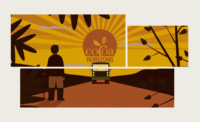West African farmers face low wages and the stigma of child labor. But these problems cannot be ignored, as Africa supplies the most cocoa in the world — 68 percent, according to the Cocoa Market Update from 2014 from the World Cocoa Foundation (WCF).
Now, Hershey is partnering with Barry Callebaut to help combat these issues. And it expects that the efforts, which fall under Hershey’s Learn to Grow program, will benefit 8,000 cocoa farmers in Côte d’Ivoire.
The Learn to Grow expansion is expected to:
- Train 8,000 farmers in sustainable, modern cocoa farming practices that will increase family incomes.
- Help hundreds of children obtain birth certificates, allowing them to enroll in school for the first time.
- Build two new rural primary schools in Cote d’Ivoire to further promote education for children in cocoa communities.
- Align with WCF’s CocoaAction strategy to help cocoa communities across Côte d’Ivoire and Ghana.
“We are expanding our Hershey Learn to Grow in Côte d’Ivoirebecause we have seen how farmer training improves cocoa sustainability and positively impacts the lives of farmers and their families,” says Terry O’Day, senior v.p., chief supply chain officer, The Hershey Co.
O’Day adds that Hershey is proud to be part of CocoAction, which improves the lives of cocoa farmers, empowers women and makes a difference in the cocoa communities.
“It’s also great to join forces with key partners, such as Barry Callebaut, to help farmers and their families by investing in schools and development projects that help children and benefit the entire community,” O’Day says.
But this isn’t the first time Hershey and Barry Callebaut have worked together to make a difference. In 2012, the companies collaborated to build the Abokro Primary School in western Côte d’Ivoire. Today, the 190-student school features a solar-powered water wheel, a school canteen for meals and a medical clinic.
Both companies are also founding members of CocoaAction, the industry strategy to accelerate cocoa sustainability and improve the livelihoods of 300,000 cocoa farmers and their communities.
In the past, Hershey funded and helped build a factory in Ghana for Project Peanut Butter, a program that makes and distributes vitamin-enriched nutritional packets to alleviate childhood malnutrition.
Through its Project Peanut Butter work, Hershey has also launched an innovative program to provide supplemental nutrition to school children in Ghana. Called Energize Learning, Hershey will distribute Vivi, a highly nutritious peanut-based supplement, to children through the Ghanaian school feeding program.
The Learn to Grow programs in Côte d’Ivoire also help accelerate Hershey’s purchase of certified and sustainably grown cocoa. Hershey and its partners, such as Barry Callebaut, are working with recognized certified bodies such as UTZ Certified, Rainforest Alliance and Fair Trade USA to certify many of the farms participating in its Learn to Grow programs.
Going forward, the Hershey Learn to Grow program plans to enroll approximately 70,000 West African cocoa farmers by 2019.
“We are honored to have been selected by Hershey to support their cocoa sustainability programs and to source more certified cocoa,” says Dave Johnson, president and ceo, Barry Callebaut Americas. “As a long-term partner of Hershey, we will do everything to support the company in their commitment to purchase 100 percent certified and sustainable cocoa by 2020. With our strong presence on the ground, we help customers such as Hershey to implement their CocoaAction targets.”
Hershey is also committed to buying 100 percent certified and sustainable cocoa for all of its cocoa products worldwide by 2020. Thirty percent of all the cocoa Hershey sourced in 2014 was certified and sustainable, and the company expects to source at least 50 percent in 2015, reaching its original estimate of 40 to 50 percent certified and sustainable cocoa by 2016, a full year early.







